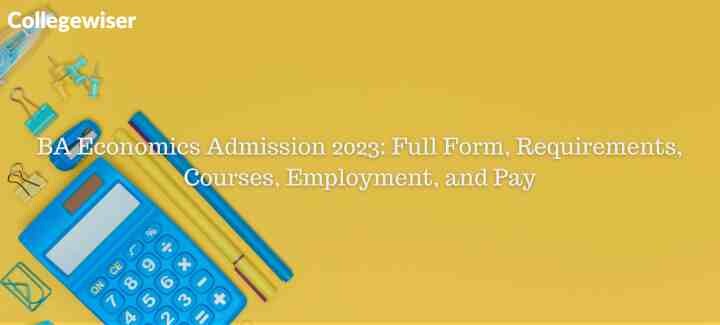Admission to BA Economics 2023: BA Economics is a bachelor’s degree program in the social sciences. Students are taught how to analyze the production, distribution, and consumption of products and services in this subject. By obtaining this degree, students can gain the necessary knowledge and skills to launch a career as an economist. Here, candidates will find detailed information about the BA Economics Admissions Process.
Enquire Now
Candidate eligibility for the BA Economics program is determined by their most recent academic degree and entrance exam score. According to the requirements, candidates must hold an intermediate degree from a reputable board or institution. For each candidate to pass this necessary certification, they must receive a score of 40% or higher.
Students pursuing a BA in Economics have the option of choosing from a variety of relevant specialties to focus their studies in that subject. The specialities available for the BA in Economics include Behavioral Economics, Environmental Economics, Labor Economics, Development Economics, Public Economics, Econometrics, International Economics, and Financial Economics.
Candidates are advised to follow the procedures of the admission process listed below for the BA in Economics:
Application: You must first complete the application form in accordance with the instructions, enter the information of your most recent academic achievement, and attach any supporting documentation you may have, such as your intermediate pass certificate.
Entrance Exams for BA Economics Admission: Several entrance exams are held in India to grant admission to BA Economics programs. Some of these include the DUET, JNUEE, BHU UET, AMI Entrance Exam, St. Xavier’s College Entrance Exam, and Christ University Entrance Exam.
Interviews: A shortlist of candidates are invited to the interview stage. Along with the evaluation of candidates’ talents and the verification of their documentation, counseling is also carried out in this step.
Merit-based selection: Candidates are chosen based on their previous academic standing in the intermediate level; they are not required to have taken the admission exam.
Course costs range from INR 15,000 to INR 65,000 for the BA Economics course.
Average Salary: After earning a BA in Economics, you can find work in both the public and private sectors. based on a 4–8 LPA projected salary.
Highlights of BA Economics Admission
| Course Name | Bachelor of Arts in Economics |
| Course Level | Under Graduate |
| Admission Process | Online/Offline |
| Eligibility | Minimum 40% in 10+2 |
| Duration | 3 Year |
| Course Fee | Rs 15,000 To Rs 65,000 Per Annum |
| Average Salary | INR 4 to INR 8 LPA |
| Job Roles | Economist, Economic Advisor, Executive, Analyst, Consultant, Researcher, Financial Analyst, Business Analyst, Economic Research Analyst, and Stock Market Analyst. |
Admission to BA Economics 2023
The Bachelor of Arts in Economics program covers all aspects of markets, products, and commerce. Learned are the fundamentals of market and economic change. It also instructs students in economic principles. The exceptions to its law are also covered in this course. From product conception to distribution, everything is learned. Full-time, regular classrooms, online, and distance learning are all available for the BA in Economics.
Eligibility Requirements
Anyone who has completed their 10+2 with high grades is eligible to apply for this program. The seats are awarded directly based only on qualifications from prior education as well as through some entrance examinations.
Structure of the Admission Fee for Economics
The cost of the BA in Economics ranges from INR 15,000 to 65,000 on average.
Admission to BA Economics Distance Learning
There are full-time, traditional classroom, online, and distance learning options for the BA in Economics program.
2023 BA Economics Syllabus
| Semester I | Semester II |
| Evolution and Definition of Economics | Economies of Scale |
| Value and Price | Total, Marginal & Average Revenue |
| Utility Demand, Supply | Theory of Marginal Productivity of Distribution |
| Returns to Factor and Return to Scale | Theories of Wages and Rent: Classical and Modern. |
| Producers equilibrium | Theories of Profit. |
| Price, Income, and Substitution effects | Profit: Net and Gross |
| Price, Income, and Cross Elasticity | Price Discrimination |
| Nature & Scope of Economics | Price and Output Determination for Firm and Industry |
| Methods of Economics Analysis | Perfect Competition Characteristics |
| Market | Monopolistic Competition |
| Laws of Production | Market Equilibrium |
| Law of Variable Proportion | Marginal & Average Costs & their Relationship |
| Isoquant’s Nature and Their Characteristics | Interest: Concept, Classical and Keynesian Theories of Interest |
| Inductive & Deductive Logic, Merit, and Demerits. | Factor Pricing |
| Indifference Curve: Consumer equilibrium (Hichs & Slutsky) | Deferent Concepts of Costs Explicit & Implicit |
| Factors of Production and Their Characteristics | Concept of Revenue |
| Elasticity of Demand | Concept of Adding up Theorem |
| Derivation of Demand Curve. | Concept and Classification |
| Demand- Supply equilibrium. | Characteristics Price- Output Determination |
| Consumer Surplus and its measurement. | Characteristics and Price- Output Determination |
| Commodities and their types | Break-Even Point |
| Cardinal (Marshal) and Ordinal Utility | Accounting, Opportunity, Total Fixed and Variable Costs |
| Approaches to Demand | – |
| Administered and Non- Administered Prices | – |
| Semester III | Semester IV |
| Structure of Indian Economy – Primary, Secondary & Tertiary Sectors | The Infrastructure of the Indian Economy |
| Trends in Agriculture Production and Productivity | Sources of Credit in Agriculture, Irrigation |
| Small Scale and Cottage Industries- Meaning, Importance, and Problems | Production and Productivity of Main Corps, |
| Rural Credit | Planning in India- Objectives, Types, Strategy |
| Recent National Population Policy. | Natural Resources- Forest, Water & Mineral |
| Population, Size, Sex, Rural-Urban Classification | Irrigation, Power, Transport, Communication |
| Population Distribution | Human Infrastructure of the Indian Economy |
| Natural Resources, Land, Water, Forest | Housing and Sanitation. |
| Mineral Resources. | Health, Nutrition, Education, Knowledge, and Skills |
| Mechanization | Economy- Land, land Utilization Pattern |
| Major Industries in India: Iron and Steel, Textile, Sugar, Cement, Automobiles | Demographic Features of M.P. |
| Land Use Pattern | Cropping Pattern |
| Land Reforms: Green Revolution | Banking and Insurance. |
| Demographic Features | Analysis of Current Five-Year Plan. |
| Cropping Pattern. | Agro-Climatic Zones |
| Agriculture: Nature and Importance | Agricultural Situation in Economy |
| Agricultural Marketing | – |
| Semester V | Semester VI |
| Macro Variables- Stock and Flow | Public Finance and Public Economics |
| Simple Investment | Wagener’s Law- Increasing Activities |
| Saving Function & Sources of Saving Mobilization | The Stock of Money and its Measures |
| National Income and Economic Welfare | Sources of Revenue- Taxes, Loans, Grants, and Aids |
| Measurement of National Income and Social Accounting in India | Recommendation of Latest Finance Commission |
| Marginal Efficiency of Capital | Public, Private, and Merits Goods |
| Keynesian Theory of Employment | Public Finance in India |
| Investment Function | Principles of Public Expenditure |
| Factors Affecting Consumption | Principles of Public Debt and Methods of Redaction |
| Factors Affecting Capital Formation | Principle of Maximum Social Advantage |
| Effective Demand | Objectives and Limitations of Monetary Policy. |
Jobs & Scope of Admission for BA Economics
Microeconomics, economic systems, macroeconomics, and other areas of economics are among its many subfields. The nature and application of economics, total margin and average revenue, and other topics are explored. They also cover topics like population, size, sex, rural-urban classification, public spending principles, etc.
Economics Jobs Available for BA
There are many work options for BA Economics graduates in both the public and private sectors, including financial services, banking, education, the stock exchange, various public and private sectors, corporations, and many more.
These graduates have a wide range of employment options; they could become investment analysts, economists, sales analysts, bank officers, etc.
Job Prospects
Numerous job prospects are available for these recent graduates. They are free to work wherever they like. They are primarily sought after in government sectors. They work in the financial and educational sectors, among other things. Both the public and private sectors may hire them. In order to hire economists, bank officers, etc., they can hire business firms, companies, etc. Gets a fantastic package.
Specializations, Eligibility, and Costs for BA Courses
| Courses | Eligibility | Duration | Fees |
| BA (Political Science) | 12th | 3 years | Rs 28400 |
| BA (History) | Rs 28575 | ||
| BA (Economics) | Rs 90550 | ||
| BA (Hons) (Event Management) | Rs 28675 | ||
| BA (Hindi) | Rs 28428 | ||
| BA (English) | Rs 28275 | ||
| BA (Ancient Indian History & Archaeology) | Rs 28075 | ||
| BA (Geography) | Rs 28528 | ||
| BA (Home Management) | Rs 28500 | ||
| BA (Home Science) | Rs 28450 | ||
| BA Fine Arts | Rs 28475 | ||
| BA (Visual Communication) | Rs 28650 | ||
| BA (Public Relations) | Rs 28300 | ||
| BA (Rural Development) | Rs 28628 | ||
| BA (Fashion Design) | Rs 28150 | ||
| BA (Hons.) (Travel and Tourism) | Rs 28228 |
Best Universities for BA Economics
Ambedkar University Delhi
Shri HK Arts College
Sri Venkateswara Veterinary University
SCAC Pune
SRM University
Recommended BA Economics Admission Institution & Costs
| University | Duration | Fees | Apply |
| Ambedkar University | 3 years | 60,000 P.A | INQUIRY |
| Loyola College | 11,000 P.A | INQUIRY | |
| SRM University | 65,000 P.A | INQUIRY | |
| ST. Xavier’s College | 6,000 P.A | INQUIRY | |
| Christ University | 50,000 P.A | INQUIRY | |
| Fergusson College | 9,450 P.A | INQUIRY | |
| Jai Hind College | 6,000 P.A | INQUIRY |
Frequently Asked Questions (FAQs) About Admission to the BA in Economics
What are some reputable universities offering this course?
Ans. Shri Ram College of Commerce at the University of Delhi is one of the best schools for this subject.
Sonepat’s Ashoka University.
Delhi University’s Hindu College
St. Xavier’s College in Kolkata, Madras Christian College in Chennai
How can I determine whether this course is right for me?
You should enroll in this course because:
If you’re a good mathematician
If you have a solid grasp of theories
If you appreciate market movements,
If you enjoy studying finance
3. What can I expect to make with this degree?
Ans. The first average compensation is between Rs. 1 and Rs. 5 lacs annually. While those with experience may earn between Rs. 10 and Rs. 14 Lac annually.




